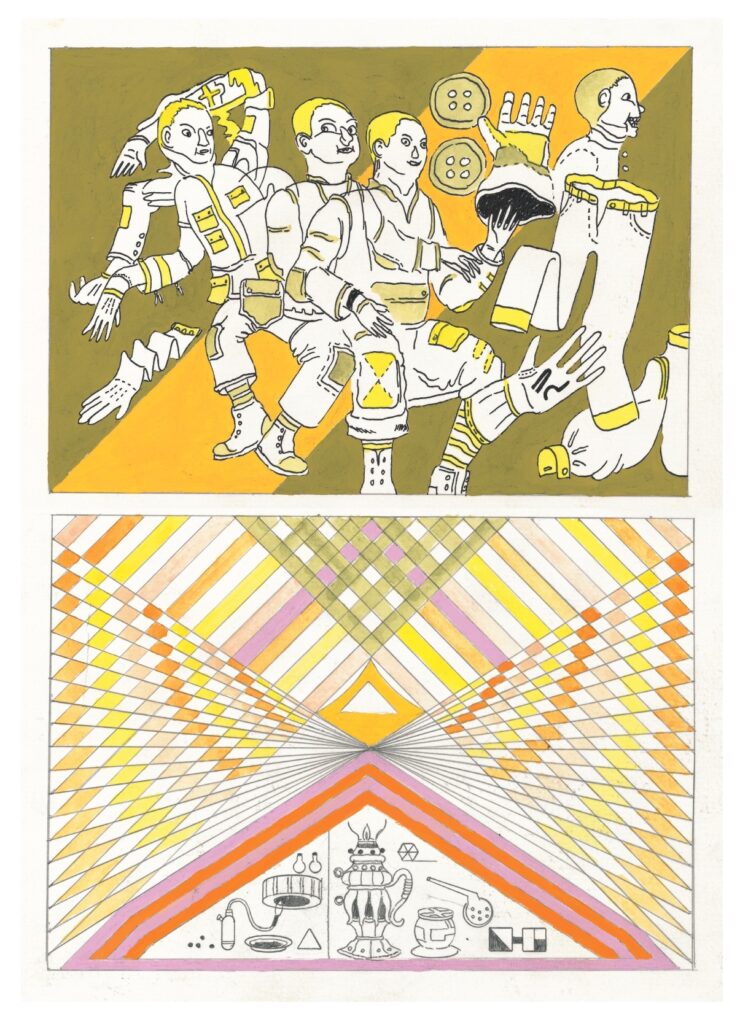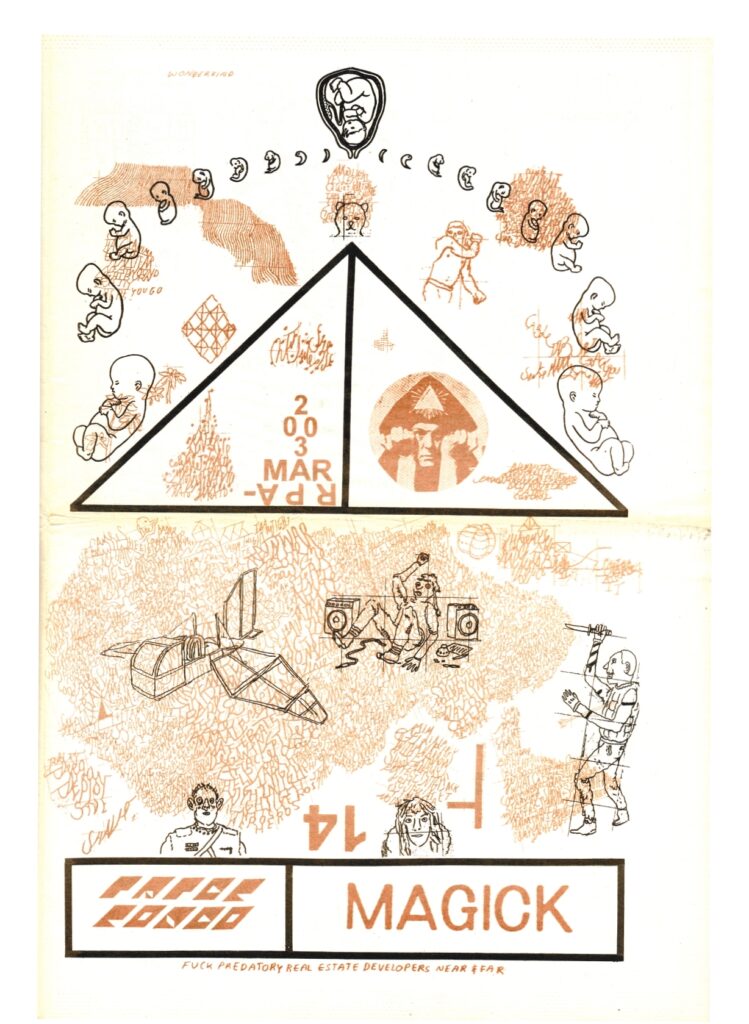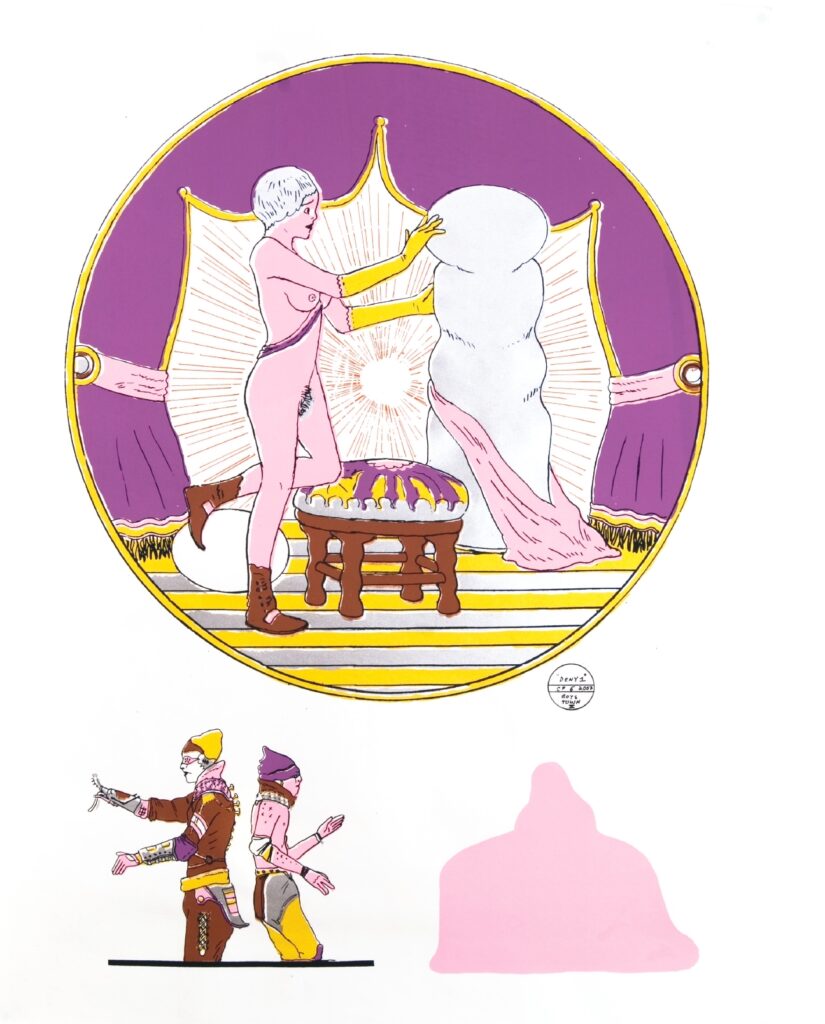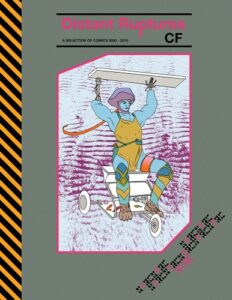Christopher Forgues meets me in a dark hallway and shows me in. Shelving is the dominant structure in the tiny room: piles of homemade electronics, books, several drills, drafting tools, giant rolls of paper. It resembles more the studio of a sound engineer than of a comic artist, hinting at Forgues’s parallel life as a musician. Universal Cell Unlock, the title of Forgues’s current noise music project, evokes a movie cliché about a fictional warden’s device that unlocks all prison cells at once, or, perhaps, a machine that unlocks the cells of the body.
Article continues after advertisement
Cell, of course, is also another term for panel, a common building block of comics, one that Forgues eschews often. We sit down and share a bag of Lay’s potato chips and a soda.
For this interview, conducted on a hot day in 2022, two hours were spent in his studio. Emails were also exchanged, as were some odd telepathic moments. Forgues has engrossing blue-grey eyes, crewcut silver hair, and a closely cropped beard. Like his artwork, his personality is both playful and militant. Deeply influenced by Fort Thunder, the artist collective in Providence, Rhode Island that valued mutant cartoonishness and thrifted maximalism, Forgues’s comics pulse with loathing for authority figures—cops, parents, presidents and beyond. And yet, the sentimental and erogenous possibilities of control recur in his work. Perhaps it is simply a question of to what ends power is used.
—Rob Goyanes
Rob Goyanes: Let’s talk about how you got started making comics.
Christopher Forgues: I’ve always wanted to make comics. I’ve always tried, and it’s always been really hard and went badly. Even after graduating from art school, everything I did was bad. I was struggling because I was at the mercy of different influences. At that age, you don’t know enough about yourself or what’s possible, or the world, or what’s even happened already. You feel like you’ve been waiting your entire life, but you don’t yet have the skill or the wherewithal or the discipline to achieve it yet. It’s just this act of faith.
And if you haven’t made any good work, you don’t have any proof you’re even a fucking artist. There can be this hungry quality to that. For every little shred you manage to do, you’re like: “This proves it! This proves something!” That can get in your way a lot.
RG: How did it get in your way?
CF: When I was younger, I was like, “I want to draw straight to ink. I’m just going to practice until when I sit down to draw it just comes out perfectly.” I worshiped R. Crumb and Moebius. They have such a rich, deep drawing style that’s obviously born out of a lot of practice. It looks as if they sit down and just draw this thing, you know?
RG: What’s your process of working on a comic?
CF: You’re supposed to start with the ending, right? You’re supposed to know where you’re going and reverse engineer it. Gag cartoons do that. Like Ernie Bushmiller, who did Nancy. I know this is the way it’s supposed to work. I teach this class where I tell these kids to do that. But I have no idea how to do that! [Laughter]
One of the hardest things about comics is being beholden to the page. It all has to happen there.
RG: Maybe the process is hard because comics are a special creature, art and story in one.
CF: With comics, it’s weird because it can be about the drawing, but the drawing is also part of the story. Typically, early on, I would sit down, draw a panel, try to draw another panel, try to draw another panel. I could talk about this room. Or maybe if there’s an object in there or something. Or some aspect of their costume, if there’s some tool or something. Then you just play the “what-if” game, or, like, “What is this?” In one of the comics, there’s this sneezing part, because I had a fever.
Often, if I do a drawing, I see a comic in there, and I think about it, and I’m like, “Ah, it’d be nice if I did that. Why don’t I try working that way?”
I went on this whole orbit of trying to be like, “I need to learn how to make a story the real way!” I’ve been thinking this for years, and I’ve been trying all these different things…like, there’s a strip in here that’s not gridded. The panels were all drawn separately, at different times, and collaged. You know what I mean? I developed it out of these flashes of little images. Film, you can edit and move around; word processing, you can shuffle stuff around. For the William Softkey book, I made the same three panels in the exact same size over and over and over again so that I could shuffle and delete and replace them.
RG: It’s got a modular structure.
CF: Yeah. One of the hardest things about comics is being beholden to the page. It all has to happen there. It makes it more like a painting or more like an artwork. But I want it to be more practical. I was jealous of the writers and the movie people.
RG: You wanted freedom from the comic process.
CF: I wanted the flexibility and the fluidness, yeah. I really wish I could say I had a better understanding of my own process. I always struggle with it. One thing that helped me was hearing Cormac McCarthy talk about his process on Oprah. He said, “You can’t plot things out. You just have to trust in, you know, wherever it comes from.” I hate planning and having a plan. I mean, I do and I don’t. It’s almost harder to work that way, somehow.
RG: With the plan?
CF: Yeah, or like—it’s important to have the plan so you can abandon it. I’ve messed around enough to know that I can experiment, that it’s not the end of the world, and it usually doesn’t come out too horrible. And to embrace the constant sense of failure, knowing that it’s always going to be like that, and this fantasy I had as a kid of Moebius or somebody sitting down and…that, that’s not true either. Those people all struggle and they know that very well. And that’s how you do great things, always.
RG: It takes time, and it’s messy.
CF: It’s just the same feeling of sitting there and being, like…“Should I…kill myself?” [Both laugh] “What am I doing here?” Or like, “I might as well do this, because otherwise I will kill myself.” If I’m going to die anyway, and it’s all meaningless and a sad struggle from top to bottom, then yeah, let’s make a funny cartoon. Even if it’s two seconds out of someone’s day and they’re like, “That was interesting or funny or took me away or a moment of beauty…” It’s that same romantic idea.
But also, I don’t care if the world ends, I’m going to sit here and do this because I don’t know what else to do. I’m built for this. I was born to do this. I really feel that way. For better or worse, I am this thing.
RG: I’m curious how music—and specifically, your project Kites—intersected with your comics work during the time covered in Distant Ruptures. Peace Trials came out in 2005, and Hallucination Guillotine in 2007.
CF: What these efforts share is a longing for some kind of utopia, or a hard puzzlement between beauty and terror, and the relations there. It was a time of intense creative experimentation and expansion, I felt there were a lot of untested points to prove. I felt like there was a wide-open field that no one seemed to be aware of. I came to making instruments because my father had taught electronics in the Coast Guard, and because I had met Jessica Rylan, a sound artist who makes her own synthesizers. There’s no way I could have begun without her teaching me so many things. With Kites I was trying to express some kind of loss but also the ecstasy and joy of being alive, however brief and confusing life might turn out to be. Some kind of spiritual survival, self-defense, acting on intuition.
RG: You build your own electronic instruments—how does that play into your comic practice?
CF: Early on, I didn’t really know what a story was, so I thought of the story like a circuit. You have a transistor, a tiny device that sends a small signal to control a much bigger one, in the same way you can turn a valve and a lot of pent-up water somewhere suddenly rushes out. Maybe you have something controlling that automatically. Maybe you feedback part of it—an amplifier—so that it gets really loud. A resistor controls that flow-back, and that’s your volume control: a character in the way or something.
I imagined characters that have this ability to channel some kind of energy, but there’s a control on that power, which is minor but potent. Then there’s a speaker that uses that energy and projects it. They’re all different functions, but they’re working in concert. Some of them appear to be in conflict, but it’s making this event happen, and the energy is flowing through this thing. I really like this idea as a book—as a story concept.
RG: Yeah, that’s present in a lot of your stories. It structures a lot of the narrative. Do you see the world working in a similar sort of way? Like this mechanistic sort of like exchange of signals and energy?
CF: The world is definitely a synth. [Laughs]
RG: Let’s talk about how plot works for you.
CF: One of the hard things about plot, for me, is the necessity of having the antagonist—you want the antagonist to be almost more developed than the protagonist. They need a worthy opponent, you know? That character doesn’t need to be a villain, they only need to be in conflict with what the protagonist wants or needs: they just need to be in the way. But coming out of comics history, or just history in general, I was really struggling with like—I don’t ever want there to be a villain, basically. I don’t ever want there to be a character that’s wrong, or “the bad one.” Maybe a character is kind of cute, but dangerous in certain circumstances. Maybe they seem kind of evil, or megalomaniacal, but their motives are natural motives. Animals do things that are unacceptable to people. But it’s in their nature.
RG: When it comes to plot, your comics have this sticky quality. Instead of this linear thing, it’s like getting caught in something.
CF: You gotta let it wash over you.
RG: The comic is sort of functioning more like a painting. Not every cell is telling a story, it’s more about the beauty of the whole thing.
CF: That’s one of the hardest things about comics. They have simultaneous compositions: you have the whole page, and you have each individual panel. None of them are free from the others. And the story, too, the machine of the book—of like flipping the pages, or whatever—there are those relationships, too. I don’t know. It’s all on top of itself.
RG: In one episode of Wizard Acorn, a character says: “When I was little/ Witches changed me/ By exposure/ To wooden and ceramic machines.” What do the words in a comic need to do, compared to the visuals?
CF: Text in a comic can amplify or do something strange in parallel. Using words is a little like saying magic spells, or the magic of a name, knowing something’s name, giving something a name. It can either nail down the meaning of a drawing or open it up. That definitive quality of language is powerful. Once you name the dog, it’s your dog. Before that, it’s just a creature.
RG: Do you want to talk about the flood, back in Providence?
CF: Sure…it was a massive flood. It was on the news. We lived in a big warehouse, and it was right by the Woonasquatucket river because they would dump electroplating and chemicals and dyes in there. It was very poisoned. When it overflowed, the water came out of the riverbed and into this road tucked into the back of the building. It carved out a pool-sized hollow at the entrance, maybe an eight-foot-deep hole in the ground. I went in there to get these family photos, and the current was so strong that it was almost impossible. It was like a brick wall. It was like a channel, with the river just blasting out.
Text in a comic can amplify or do something strange in parallel….That definitive quality of language is powerful.
The photos were in storage in the basement, but they were on this huge platform, up five feet high. And they were all underwater anyway. I got a kayak in there and my head was inches from the ceiling. It was pitch black and I had a headlamp on, and a respirator because the air was thick with god-knows-what.
But I found my cat down there. She was standing on a pile of prints, like a little island. I thought she was a stuffed animal at first because she was so motionless, and her eyes shone, and then I was like, oh. She jumped into the water. I couldn’t catch up with her, so I had to jump out of the kayak into the water, too. There were all these enormous objects under the water, so I’m trying to run but my legs keep hitting cars and speaker cabinets and random metal junk—and it’s a warehouse, so it’s an enormous footprint. I finally get to the opposite wall, and she’s jumping up on the wall, over and over again, like all the switches in her brain had been flicked to be like, okay, this is it.
I finally got her and stuffed her in the kayak. I had to hold her in there because she kept trying to jump out. And then when I got out, my skin was just…red. I felt itchy all over, you know?
RG: Was the cat okay?
CF: Yeah, she was okay. I wrapped her up in a blanket and I was gently petting her head and putting all these calming zone-out herbs right in front of her. So, just got her really high.
RG: Was this in the kayak or afterwards?
CF: Afterwards, when I got her back to the house. I thought I was saving somebody’s cat. I was like, “Hey, no problem, I can’t help being a hero, baby,” you know? And everybody was like, “This isn’t our cat, we don’t want it, can you please take it?” I was like, “I don’t want a cat!” And they were like, “This is your cat.”
RG: Oh—I thought this was your cat.
CF: No, it was just a stray. I named her Woden.
RG: Did you retrieve any of your notebooks?
CF: No. All the paper was destroyed. I lost—yeah, I lost everything. It was a total wipe. A reset.
RG: What was the fallout of that? Were you devastated?
CF: No. I’m good with that stuff. I just let a storage space go to auction recently, too, actually.
RG: Why?
CF: The books exist. Other people have them. This stuff was all gone, but other people had them.
RG: How is making art different now from the 2000s?
CF: I just think about…the state of things today, and sharing works in progress—everything is some kind of performative flimflam. You’re always being interrupted, or disturbed by questions, or distracted by grandstanding. There’s this expectation that you’re available at all times to all people, and that it’s all fine and good spending three-quarters of the day simply answering messages without even creating anything of your own. Just to get through the fucking day.
There’s this idea that, of course I want the widest possible worldwide audience for this, but when I started doing it, it was not for everyone. It was kind of a private thing that you shared with people in the mail, or in certain stores, or just by handing it to people. The things you had to answer to, or something, were so few; if somebody tested you, you could just kind of turn away.
You have to draw the line somewhere and have a place that’s sacred where people can’t go. A lot of the Powr Mastrs books were drawn in Maine in the winter. I could go there for two months in the winter, and no one was around. It was pretty. It was nice.
__________________________________
From Distant Ruptures by Christopher Forgues, edited by Sammy Harkham, with contributions from Rob Goyanes and Gabriel Winslow-Yost. Copyright © 2024. Available from New York Review Books.




